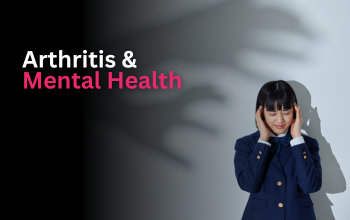Parenting with Arthritis
Eileen Davidson could barely hold her son when he wasn’t even two years old. It hurt too much. Her body felt weak and her mind was in turmoil. Daily life became intolerable with unrelenting fatigue and intense pain.
She always knew of arthritis. Her grandmother and aunt had it. She figured it happened to the elderly. However, at 29, her eyes were opened when she was diagnosed with rheumatoid arthritis and placed on disability. That same week, her aunt passed away before she could seek her advice about the disease they now shared. Shortly after, Davidson was also diagnosed with osteoarthritis and fibromyalgia.
She saw the devastating effect arthritis had on her aunt’s body. She was in a wheelchair and struggled to walk on her own. Davidson remembers her grandmother’s cries at night for help after her double knee replacements.
“The family memories of arthritis haunted me,” Davidson said. “I fell into a profound depression with rampant anxiety.”
Not alone
Catherine Backman, a senior scientist of rehabilitation at Arthritis Research Canada, has examined the impact of arthritis on motherhood and said Davidson is not alone in her experience of life with rheumatoid arthritis. Many mothers involved in her research described their diagnosis as “coming on like a freight train,” according to Backman.
They also identified fatigue as a major challenge in caring for their children. “I would say that I’m more tired than most mothers, be it the medication or be it the arthritis, I am definitely more tired,” one participant said.
But while many women identified challenges associated with their disease, Backman said being a mother gave them a sense of strength and purpose that ultimately trumped most negative effects of arthritis.
It’s a full-time job
Davidson can relate to these findings. She is a single mother and doesn’t have the option of taking a sick day from life. Managing her health and arthritis became her full-time job.
“I tried to find answers so I could be the mother I needed to be,” she said.
Davidson started by trying to find the right biologic medication and listened to her health care professionals. She exercised, watched what she ate and lost a significant amount of weight. She learned how important disease management and self-care are for living with arthritis.
Though, she still feels guilty when she can’t do certain activities with her son.
“One of the most difficult aspects of being a chronically ill single mother is the emotions of feeling guilty when I can’t do more,” she said. “The energy of autoimmune arthritis and a toddler do not match. There is always that nagging fatigue, even when pain is at a minimum.”
According to Backman’s research, other women with arthritis feel the same way.
One mother who participated in Backman’s study identified guilt as a challenge and said, “You don’t have the energy to be doing something you should be doing with them.”
However, others felt having arthritis made their children empathetic and gave them more quality down time to be together as a family – even if they weren’t doing high-energy activities.
Need for resources
Backman’s research is not meant to represent all women with arthritis. However, it indicates that many mothers with arthritis have shared experiences and challenges. It also identifies a need for more resources for mothers living with arthritis.
Davidson is a big supporter of arthritis awareness and resources.
After living with the devastating effects and misconceptions of arthritis, she decided to become a patient advocate for the disease. She is a member of Arthritis Research Canada’s Patient Advisory Board. And her writing and advocacy has been featured with Pain BC, US Pain Foundation, in Reader’s Digest, Inked Magazine, Healthline, The Mighty and more.
Patient advocacy helps her feel as if she is combating her illness in every way she can while helping others along the way and being the best mother she can be.
“Together we can make change,” she said.
Want to find out more about Catherine Backman’s research on arthritis and motherhood? Please click here and here.




















































